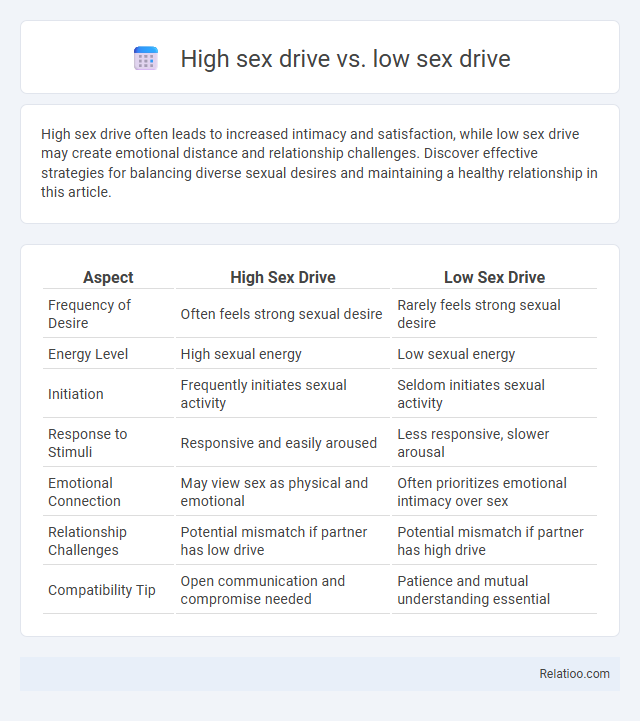High sex drive often leads to increased intimacy and satisfaction, while low sex drive may create emotional distance and relationship challenges. Discover effective strategies for balancing diverse sexual desires and maintaining a healthy relationship in this article.
Table of Comparison
| Aspect | High Sex Drive | Low Sex Drive |
|---|---|---|
| Frequency of Desire | Often feels strong sexual desire | Rarely feels strong sexual desire |
| Energy Level | High sexual energy | Low sexual energy |
| Initiation | Frequently initiates sexual activity | Seldom initiates sexual activity |
| Response to Stimuli | Responsive and easily aroused | Less responsive, slower arousal |
| Emotional Connection | May view sex as physical and emotional | Often prioritizes emotional intimacy over sex |
| Relationship Challenges | Potential mismatch if partner has low drive | Potential mismatch if partner has high drive |
| Compatibility Tip | Open communication and compromise needed | Patience and mutual understanding essential |
Understanding Sex Drive: Definitions and Variations
Sex drive, also known as libido, varies significantly among individuals, with high sex drive characterized by frequent sexual thoughts and desires, while low sex drive involves diminished sexual interest or activity. Factors influencing your sex drive include hormonal levels, psychological well-being, stress, and relationship dynamics, making it a complex, multifaceted aspect of human behavior. Understanding these variations is essential to recognize what is normal for you and to address any concerns with appropriate medical or psychological support.
Biological Factors Influencing Libido
Biological factors influencing sex drive include hormone levels such as testosterone and estrogen, which play a crucial role in regulating libido. High sex drive often correlates with elevated hormone levels and optimal neurotransmitter function, while low sex drive may result from hormonal imbalances, chronic stress, or medical conditions. Understanding these biological influences helps you address changes in libido effectively by targeting the root physiological causes.
Psychological Elements Affecting Sexual Desire
Psychological elements significantly influence sex drive, with high sex drive often linked to positive self-esteem, reduced stress, and emotional intimacy, while low sex drive can result from anxiety, depression, or unresolved trauma. Your mental health status, relationship satisfaction, and stress levels directly affect sexual desire, highlighting the intricate connection between mind and libido. Understanding these psychological factors helps tailor strategies to balance sex drive effectively for enhanced sexual well-being.
High Sex Drive: Causes and Common Traits
High sex drive often results from elevated testosterone levels, youthful age, and psychological factors such as increased confidence or low stress. Common traits include frequent sexual thoughts, strong physical desire, and a proactive approach to intimacy. Understanding your unique sex drive can help balance personal relationships and overall well-being.
Low Sex Drive: Causes and Contributing Factors
Low sex drive, medically known as hyposexual desire disorder, can stem from a combination of physical, psychological, and lifestyle factors. Hormonal imbalances such as low testosterone or thyroid issues, chronic illnesses like diabetes, and medications including antidepressants often contribute to reduced libido. Psychological conditions like depression, anxiety, stress, and relationship problems also play significant roles in decreasing sexual desire.
Relationship Dynamics: Navigating Different Sex Drives
High sex drive and low sex drive can create significant challenges in relationship dynamics, requiring open communication to balance partners' needs and expectations. Understanding the biological and psychological factors behind varying sex drives helps couples cultivate empathy and find mutually satisfying solutions such as scheduling intimacy or exploring alternative forms of connection. Navigating different sex drives effectively strengthens emotional bonds and fosters a healthy, adaptable partnership.
Communication Strategies for Mismatched Libidos
Effective communication strategies for mismatched libidos involve open and honest discussions about desires, boundaries, and expectations to foster mutual understanding and respect. You can utilize active listening and empathy to address any feelings of rejection or frustration, ensuring both partners feel valued and heard. Scheduling intimate moments and exploring alternative forms of physical affection may help balance differing sex drives while strengthening emotional connection.
Medical Conditions and Medications Impacting Sex Drive
Medical conditions such as diabetes, depression, and hormonal imbalances often cause low sex drive by affecting neurotransmitter levels and blood flow. Medications including antidepressants, antihypertensives, and hormonal treatments can significantly reduce libido by altering hormonal balance or neural pathways. High sex drive may also be influenced by hormonal disorders like hyperthyroidism or the use of certain stimulants, highlighting the complex interaction between medical factors and sexual desire.
When to Seek Professional Help for Libido Concerns
If your sex drive significantly declines or becomes excessively high, affecting your relationships, mood, or daily life, it may be time to seek professional help. Persistent changes in libido can be linked to hormonal imbalances, mental health issues, or medication side effects that require medical evaluation. You should consult a healthcare provider if your libido concerns cause distress or interfere with your well-being and intimacy.
Tips for Balancing and Enhancing Sexual Intimacy
High sex drive often involves frequent desire and increased sexual thoughts, while low sex drive may result from stress, hormonal changes, or medical conditions, impacting intimacy levels. Understanding and communicating your unique sexual needs fosters empathy and connection, allowing you and your partner to explore activities that enhance pleasure and emotional closeness. Regular exercise, healthy diet, stress management, and professional guidance can effectively balance and boost sex drive, improving overall relationship satisfaction.

Infographic: High sex drive vs low sex drive
 relatioo.com
relatioo.com